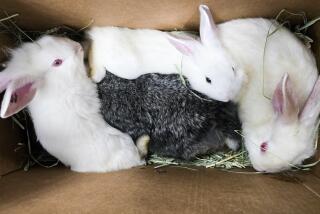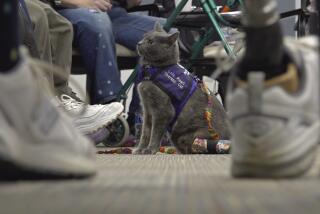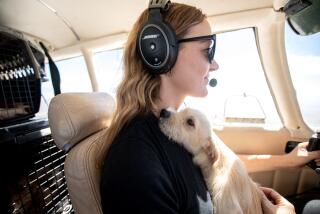Kansas-Ohio Connection : Foster Homes Set Up for Puppy Guide Dogs
- Share via
TOPEKA, Kan. — Four Labrador retriever puppies arrived recently in Neosho County, headed for homes with area families.
But these puppies will be in Kansas for just a year. Then the dogs will go into a rigorous training program in Ohio, where they will learn how to guide blind people through stores, into restaurants and across streets.
The dogs are part of an agreement reached in 1986 by Marta Laylander, the county’s agricultural extension agent, with Pilot Dogs Inc. of Columbus, Ohio.
Under the agreement, area 4-H children raise dogs bred by Pilot until the dogs are big enough to start training.
Most of the nine guide dog schools in the nation arrange with 4-H programs to raise the puppies they breed, Laylander said. But Kansas was always too far away from any of the schools--until Laylander persuaded Delta Airlines to fly the dogs from Columbus to Kansas City, Kan., for free.
For the children and families who take the dogs, “it’s an opportunity for them to have contact with one of these dogs that is so superior in temperament and intelligence,” Laylander said.
For the dogs, it is part of a necessary process to help them get used to people.
“They have to be raised in a family environment and socialized to the world in general,” Laylander said.
To participate in the program, children must be at least 14 years old and have two years of dog training experience, usually through a county 4-H program. They also have to promise to take care of the dogs for a year--and then give them up.
“They have to say that yes, they’ll raise the puppy in the house, take it to the veterinarian and complete an obedience course with it,” Laylander said. “They also have to give it up at the end of the year, and sometimes that’s hard.”
But, Laylander said, the children know the dogs will help blind people.
“We try to remember what we’re raising them for,” Laylander said.
Fran Clay’s daughter, Jodi, 18, has raised two of the dogs--a Labrador named Pollyanna and a boxer named Wiggles.
Both dogs were “very lovable, very sweet natured,” Fran Clay said, although otherwise very different.
Pollyanna was “super intelligent,” Clay said. “She just waited, seeming to say, ‘Show me what you want to do, and I’ll do it.’ Wiggles was more, ‘You really want me to do that?’ ”
Pollyanna is now with a 21-year-old blind woman in Ohio, and Wiggles is still in the training program. Trainers there have told Clay they will have to find a shorter person for Wiggles, the runt of the litter.
While the dogs are in Kansas, Laylander has strict rules about their upbringing. For example, the dogs are not allowed to eat anything but dog food.
“You don’t want them taking something off a blind person’s plate,” Clay said.
The dogs are also taught obedience, including not to jump on people and to obey basic commands.
“We don’t do anything tricky,” Laylander said. “We leave that to Pilot.”
The families of the 4-H Club members who take the dogs pay for the dogs’ food but receive compensation for all veterinary expenses.
When they go to Pilot, the training for the dogs becomes tougher. First, they are in quarantine for two weeks, to determine whether they are healthy. Then they spend four to six months working with a trainer. Then they are matched with a blind person, and spend another month learning to live with that person.
So far, the dogs in the Neosho program have done well. The first four Labradors successfully completed the training and are now with blind people. Three of the four boxers the group received next are still in the training program, but one was excluded because of a hip deformity.
More to Read
Sign up for Essential California
The most important California stories and recommendations in your inbox every morning.
You may occasionally receive promotional content from the Los Angeles Times.










